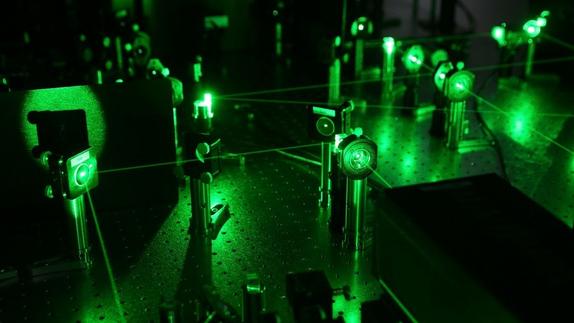 This photo taken on May 25, 2016 shows a quantum simulation laboratory under the Chinese Academy of Sciences, in Shanghai, east China. (CAI YANG / XINHUA)
This photo taken on May 25, 2016 shows a quantum simulation laboratory under the Chinese Academy of Sciences, in Shanghai, east China. (CAI YANG / XINHUA)
HEFEI - A research team including renowned Chinese quantum physicist Pan Jianwei announced Friday a significant computing breakthrough of achieving quantum computational advantage.
The team established a quantum computer prototype, named "Jiuzhang", in which up to 76 photons were detected. The study was published in Science magazine online.
The achievement marks China's first milestone on the path to full-scale quantum computing - a quantum computational advantage, also known as "quantum supremacy," which indicates an overwhelming quantum computational speedup.
A team of Chinese scientists have established a quantum computer prototype in which up to 76 photons were detected. No traditional computer can perform the same task in a reasonable amount of time, and the speedup is unlikely to be overturned by classical algorithmic or hardware improvements, according to the team
No traditional computer can perform the same task in a reasonable amount of time, and the speedup is unlikely to be overturned by classical algorithmic or hardware improvements, according to the team.
ALSO READ: Xi highlights crucial role of quantum tech
In the study, Gaussian boson sampling (GBS), a classical simulation algorithm, was used to provide a highly efficient way of demonstrating quantum computational speedup in solving some well-defined tasks.
The average detected photon number by the prototype is 43, while up to 76 output photon-clicks were observed.
Jiuzhang's quantum computing system can implement large-scale GBS 100 trillion times faster than the world's fastest existing supercomputer.
The team also said the new prototype processes 10 billion times faster than the 53-qubit quantum computer developed by Google.
"Quantum computational advantage is like a threshold," said Lu Chaoyang, professor of the University of Science and Technology of China. "It means that, when a new quantum computer prototype's capacity surpasses that of the strongest traditional computer in handling a particular task, it proves that it will possibly make breakthroughs in multiple other areas."
The breakthrough is the result of 20 years of effort by Pan's team, which conquered several major technological stumbling blocks, including a high-quality photon source.
READ MORE: Scientists identify new material for making Quantum computer
"For example, it is easy for us to have one sip of water each time, but it is difficult to drink just a water molecule each time," Pan said. "A high-quality photon source needs to 'release' just one photon each time, and each photon needs to be exactly the same, which is quite a challenge."
Compared with conventional computers, Jiuzhang is currently just a "champion in one single area," but its super-computing capacity has application potential in areas such as graph theory, machine learning and quantum chemistry, according to the team.


